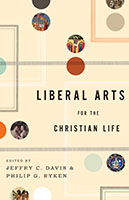About the Editors
Jeffry C. Davis (PhD, University of Illinois, Chicago) is associate professor of English and director of interdisciplinary studies at Wheaton College.
Philip G. Ryken (DPhil, University of Oxford) is president of Wheaton College.
Overview
This book consists of a collection of essays on the role and importance of the liberal arts in a Christian context. It was assembled to honor professor Leland Ryken of Wheaton College. Professor Ryken was not merely an academic: he was someone who loved teaching students. As a result, the chapters in this book are not aimed at specialists (as essays in a festschrift often are), but rather they are aimed at an undergraduate level. The goal was to create a book that would encourage, challenge, and instruct students on the vital importance of the liberal arts for the Christian life.
A liberal arts education can allow people to maximize their lives, which is far more significant than training for their career alone.
The chapters are short (on average approximately 10 pages) and concise. Many different topics are covered, but in an interrelated and overlapping fashion. The book is divided into five major sections, each of which consists of a number of chapters that engage with aspects of the relationship between Christianity and the liberal arts. Overall, the argument is that the liberal arts are not optional. They are enriching and deserve a significant place in the life of the church. A liberal arts education should not be assessed on pragmatic lines, or evaluated in terms of job placement or economic benefit (although it is argued that a liberal arts education can provide individuals with the foundational intellectual skills to succeed in many different fields, and also to be highly trainable for career changes). Students pursuing liberal arts are not wasting their time, provided they are interested in a liberal arts education and not merely a liberal arts degree.
Table of Contents
Preface
The Student’s Calling by Leland Ryken
Introduction
Section 1. Terminology and Background
- The Countercultural Quest of Christian Liberal Arts
- Liberal Education and Book Learning
- Evangelicals, Colleges, and American Nation Building
Section 2. Theological Convictions
- Liberal Arts Education and the Doctrine of Humanity
- Faithful Christian Learning
- Liberal Arts as a Redemptive Enterprise
- Loving God as the Key to a Christian Liberal Arts Education
Section 3. Habits and Virtues
- The Lost Tools of Learning and the Habits of a Scholarly Mind
- How to Read a Book
- Writing for Life
- Listening, Speaking, and the Art of Living
- Educating for Intellectual Character
- Beyond Building a Resume
Section 4. Divisional Areas of Study
- A World of Discovery though the Natural Sciences
- Exploring a Universe of Relationships through the Social Sciences
- The Humanities as Indulgence or Necessity?
- Singing God’s Praise
- Learning to Perceive through Visual Art
- Theater as an Imperfect Mirror
Section 5. The End of Christian Arts
- Social Media and the Loss of Embodied Communication
- Learning to Live Redemptively in Your Own Body
- Personal Formation and the Understanding Heart
- Learning for a Lifetime
- The Gospel, Liberal Arts, and Global Engagement
- Liberal Arts in the New Jerusalem
Contributors
General Index
Scripture Index
Book Summary
Section One: Terminology and Background
One of the most significant challenges today is to convince students (and their parents) that a liberal arts education is worth pursuing. Frequently it is objected that such a degree does not open doors for lucrative employment. Sometimes Christians are concerned that studying so-called secular subjects and writings can be detrimental. Although there are dangers, such a course of study can actually strengthen faith.
Liberal arts education predates …
[To continue reading this summary, please see below....]
The remainder of this article is premium content. Become a member to continue reading.
Already have an account? Sign In
